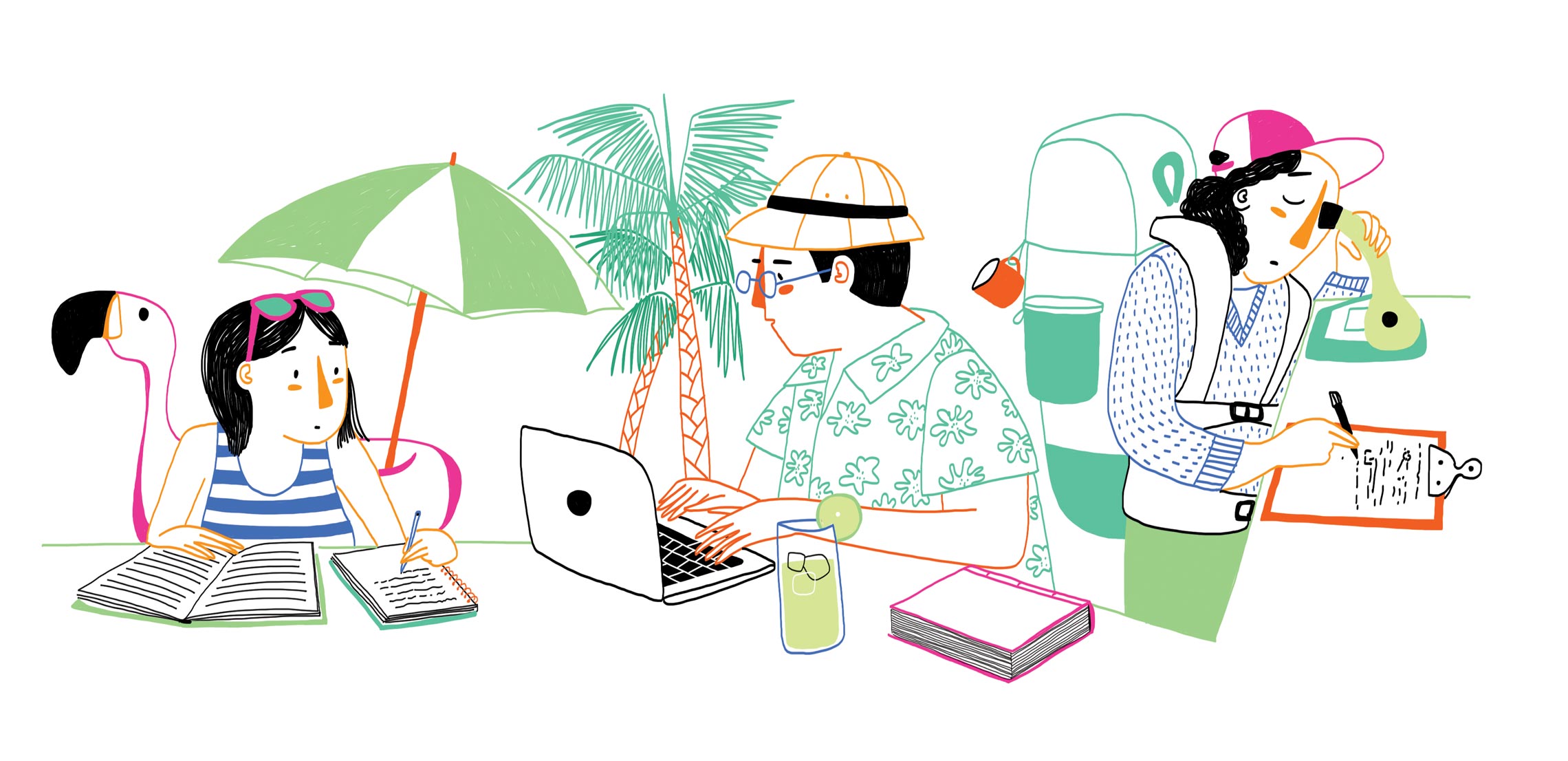School is out for the summer. University classrooms and corridors are empty and administrative services are working reduced hours. Most researchers, however, are following the same daily routine. “This time of year is great for us,” says mathematician José Alberto Cuminato, director of the Center for Mathematics Applied to Industry (CEMEAI), one of the Research, Innovation, and Dissemination Centers (RIDC) funded by FAPESP, based at the Institute for Mathematical and Computational Sciences at the University of São Paulo (ICMC-USP) in São Carlos. “I don’t need to teach, I have no meetings to attend. I have more time to read my students’ theses and discuss their work with them,” he explains.
Pharmacist Suzan Pantaroto de Vasconcellos, coordinator of the Graduate Studies Chamber of the Federal University of São Paulo (UNIFESP), Diadema campus, has similar feelings about this period of the year, which she describes as “highly productive, but with very little stress,” because the pause in teaching and administrative activities allows her to dedicate more time to her research. “Like many of my colleagues, I often spend the holidays writing papers with my students. It is a chance to continue—and sometimes resume—your research, and to work with students who perhaps need more guidance,” she adds.
Even when universities close entirely between Christmas and the New Year, researchers rarely take time off. This is actually the case all year round: in general, the grants and scholarships available in Brazil do not include annual leave. From undergraduate research to postdoctorates, there are no guidelines regulating time off. As a result, leave is arranged individually between the student and their advisor—or for PhDs, between the researcher and their supervisor.
“The advisor knows how things are going,” summarizes Cuminato, who allows students to take leave if their work is progressing well. “If their research is going well, there is no reason not to give them some time off. If it’s going badly or there is a tight deadline ahead, the teacher may say no.” Vasconcellos also takes a flexible approach with her students, who can negotiate leave as long as they are up to date with their work and have arranged for a colleague to provide temporary cover.
“I am very flexible, but I have strict requirements,” says psychiatrist Rodrigo Affonseca Bressan, head of research at the National Institute of Psychiatry for Childhood Development at UNIFESP and president of Y-Mind, a program that aims to prevent and treat mental illness. He explains that researchers linked to these projects are allowed to organize their own time based on the achievement of specific targets. “If you are at a stage where you are writing and reviewing manuscripts, you need to work. But you can do that from the beach on vacation,” he says. He describes the management model he tries to adopt with respect to this issue: “I encourage the idea of combining leisure and work. If you travel for a national or international congress, why not spend four or five days getting to know the city? Vacation and work can be intertwined.”
Nutritionist Thais de Fante talks about how things work at the institution where she is conducting her PhD research, the Laboratory of Metabolism Disorders at the University of Campinas (UNICAMP), Limeira campus, associated with the RIDC on Obesity and Comorbidities (OCRC): “Because we work with animals, which need to be constantly cared for, nobody is ever 100% on vacation, even if they go to the laboratory less often.” Having completed her experiment and being close to submitting her thesis, this will be the first year since she began her PhD that she will take real time off during the holiday period. “Being unable to take a break before starting the new year can really affect your work. Research requires a lot of physical and intellectual hard work. It tires the body and the mind,” she says.
Mental Health
Sometimes the research is at a critical moment and cannot be interrupted. Political scientist Rogério Jerônimo Barbosa started a postdoctoral fellowship at the Center for Metropolis Studies (CEM) RIDC, based at USP and the Brazilian Center for Analysis and Planning (CEBRAP), and has no plans to stop working over the holiday period. “I’m so excited. I spent the first three months collecting data, and now I’m curious about the results. So no, I will not be taking any time off.” He points out that the subject of rest is rarely discussed among graduates. “The issue of mental health is very important, and that is what vacations are good for. It is not just a right—it is fundamental to improving research quality,” he reflects.
According to Flávia Calé da Silva, president of the National Graduates Association, the absence of regulations on annual leave is one of a number of benefits that graduate researchers do not receive because the professional nature of their work is not fully recognized—people taking master’s degrees and PhDs are still categorized as students. She notes, however, that graduate education contributes significantly to scientific output in Brazil.
In this context, agreements between researchers and advisors are a matter of “common sense,” says Vasconcellos. “Since we cannot guarantee graduate students all the rights they would be entitled to as a regular employee, we try not to let their work interfere too much with everyday life—family, friends, travel. Everyone needs these things to maintain their sanity,” says the UNIFESP professor.
Republish